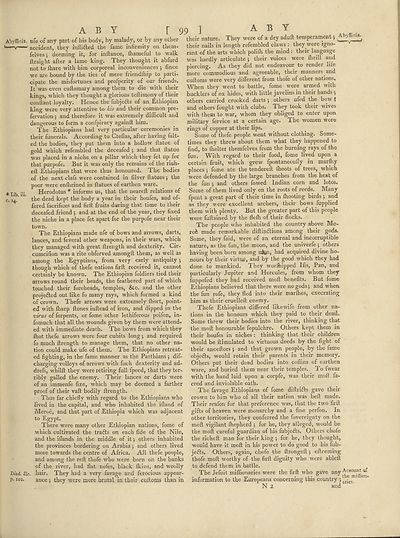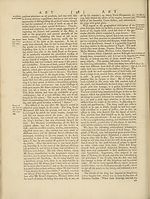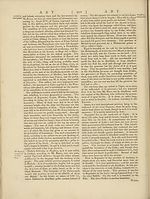Encyclopaedia Britannica, or, a Dictionary of arts, sciences, and miscellaneous literature : enlarged and improved. Illustrated with nearly six hundred engravings > Volume 1, A-AME
(117) Page 99
Download files
Complete book:
Individual page:
Thumbnail gallery: Grid view | List view

# Lib. iii
c. 24.
A B Y r
Abyffinift. ofe of any part of his body, by malady, or by any other
1 'accident, they infli&ed the fame infirmity on them-
felvesj deeming it, for inftance, fhameful to walk
ftraight after a lame king. They thought it abfurd
not to fliare with him corporeal inconveniences ; fince
we aje bound by the ties of mere friendfhip to parti¬
cipate the misfortunes and profperity of our friends.
It was even cuftomary among them to die with their
kings, which they thought a glorious teftimony of their
conftant loyalty. Hence the fubje£ls of an Ethiopian
king were very attentive to /us and their common pre-
fervation ; and therefore it was extremely difficult and
dangerous to form a confpiracy againft him.
The Ethiopians had very particular ceremonies in
their funerals. According to Ctefias, after having fail¬
ed the bodies, they put them into a hollow ftatue of
gold which refembled the deceafed ; and that ftatue
was placed in a niche on a pillar which they fet up for
that purpofe. But it was only the remains of the rich-
eft Ethiopians that were thus honoured. The bodies
of the next clafs were contained in filver ftatuesj the
poor were enfhrined in ftatues of earthen ware.
Herodotus * informs us, that the neareft relations of
the dead kept the body a year in their houfes, and of¬
fered facrifices and firft fruits during that time to their
deceafed friend j and at the end of the year, they fixed
the niche in a place fet apart for the purpofe near their
town.
The Ethiopians made ufe of bows and arrows, darts,
lances, and feveral other weapons, in their wars, which
they managed with great ftrength and dexterity. Cir-
cumcifion was a rite obferved amongft them, as well as
among the Egyptians, from very early antiquity j
though which of thefe nations firft received it, cannot
certainly be known. The Ethiopian foldiers tied their
arrows round their heads, the feathered part of which
touched their foreheads, temples, &c. and the other
proje&ed out like fo many rays, which formed a kind
of crown. Thefe arrows were extremely ffiort, point¬
ed with ffiarp ftones inftead of iron, and dipped in the
virus of ferpents, or fome other lethiferous poifon, in-
fomuch that all the wounds given by them were attend¬
ed with immediate death. The bows from which they
(hot thefe arrows were four cubits long ; and required
fo much ftrength to manage them, that no other na¬
tion could make ufe of them. The Ethiopians retreat¬
ed fighting, in the fame manner as the Parthians j dif-
charging volleys of arrows with fuch dexterity and ad-
drefs, whilft they were retiring full fpeed, that they ter¬
ribly galled the enemy. Their lances or darts were
of an immenfe fize, which may be deemed a farther
proof of their vaft bodily ftrength.
Thus far chiefly with regard to the Ethiopians who
lived in the capital, and who inhabited the ifland of
Meroe, and that part of Ethiopia which was adjacent
to Egypt.
There were many other Ethiopian nations, fome of
which cultivated the trafts on each fide of the Nile,
and the iflands in the middle of it; others inhabited
the provinces bordering on Arabia} and others lived
more towards the centre of Africa. All thefe people,
and among the reft thofe who were born on the banks
of the river, had flat nofes, black (kins, and woolly
hair. They had a very favage and ferocious appear¬
ance ; they were more brutal in their cuftoms than in
99 ] A B Y
their nature. They were of a dry aduft temperament j Ab>^r‘ia
their nails in length refembled claws : they were igno¬
rant of the arts which polifh the mind : their language
was hardly articulate ; their voices were flirill and
piercing. As they did not endeavour to render life
more commodious and agreeable, their manners and
cuftoms were very different from thofe of other nations.
When they went to battle, fome were armed with
bucklers of ox hides, with little javelins in their hands ;
others carried crooked darts ; others ufed the bow $
and others fought with clubs. I hey took their wives
with them to war, whom they obliged to enter upon
military fervice at a certain age. The women wore
rings of copper at their lips.
Some of thefe people went without clothing. Some¬
times they threw about them what they happened to
find, to (belter themfelves from the burning rays of the
fun. With regard to their food, fome lived upon a
certain fruit, which grew fpontaneoufly in marffiy
places ; fome ate the tendered (hoots of trees, which
were defended by the large branches from the heat of
the fun ; and others fowed Indian corn and lotos.
Some of them lived only on the roots of reeds. Many
fpent a great part of their time in (hooting birds ; and
as they were excellent archers, their bows fupplied
them with plenty. But the greater part of this people
were fuftained by the fleffi of their flocks.
The people who inhabited the country above Me-
rofc made remarkable diftin&ions among their gods.
Some, they faid, were of an eternal and incorruptible
nature, as the fun, the moon, and the univerfe; others
having been born among ni^n, had acquired divine ho¬
nours by their virtue, and by the good which they had
done to mankind. They worffiipped Ifis, Pan, and
particularly Jupiter and Hercules, from whom they
fuppofed they had received mod benefits. But fome
Ethiopians believed that there were no gods; and when
the fun rofe, they fled into their marffies, execrating
him as their cruelleft enemy.
Thefe Ethiopians differed likewife from other na¬
tions in the honours which they paid to their dead.
Some threw their bodies into the river, thinking that
the moft honourable fepulchre. Others kept them in
their houfes in niches : thinking that their children
would be ftimulated to virtuous deeds by the fight of
their anceftors ; and that grown people, by the fame
obje&s, would retain their parents in their memory.
Others put their dead bodies into coffins of earthen
ware, and buried them near their temples. I o fwear
with the hand laid upon a corpfe, was their moft fa-
cred and inviolable oath.
The favage Ethiopians of fome diftritts gave their
crown to him who of all their nation was bed made.
Their reafon for that preference was, that the two firft
gifts of heaven were monarchy and a fine perfon. In
other territories, they conferred the fovereignty on the
moft vigilant (hepherd ; for he, they alleged, would be
the moft careful guardian of his fubjedls. Others chofe
the richeft man for their king ; for he, they thought,
would have it moft in his power to do good to his fub-
je£ts. Others, again, chofe the ftrongeft ; efteeming
thofe moft worthy of the firft dignity who were ableft
to defend them in battle.
Nod. Sic.
p. 102.
The Jefuit miffionaries were the firft who gave any
information to the Europeans concerning this country }ar\ee5
N 2
and
c. 24.
A B Y r
Abyffinift. ofe of any part of his body, by malady, or by any other
1 'accident, they infli&ed the fame infirmity on them-
felvesj deeming it, for inftance, fhameful to walk
ftraight after a lame king. They thought it abfurd
not to fliare with him corporeal inconveniences ; fince
we aje bound by the ties of mere friendfhip to parti¬
cipate the misfortunes and profperity of our friends.
It was even cuftomary among them to die with their
kings, which they thought a glorious teftimony of their
conftant loyalty. Hence the fubje£ls of an Ethiopian
king were very attentive to /us and their common pre-
fervation ; and therefore it was extremely difficult and
dangerous to form a confpiracy againft him.
The Ethiopians had very particular ceremonies in
their funerals. According to Ctefias, after having fail¬
ed the bodies, they put them into a hollow ftatue of
gold which refembled the deceafed ; and that ftatue
was placed in a niche on a pillar which they fet up for
that purpofe. But it was only the remains of the rich-
eft Ethiopians that were thus honoured. The bodies
of the next clafs were contained in filver ftatuesj the
poor were enfhrined in ftatues of earthen ware.
Herodotus * informs us, that the neareft relations of
the dead kept the body a year in their houfes, and of¬
fered facrifices and firft fruits during that time to their
deceafed friend j and at the end of the year, they fixed
the niche in a place fet apart for the purpofe near their
town.
The Ethiopians made ufe of bows and arrows, darts,
lances, and feveral other weapons, in their wars, which
they managed with great ftrength and dexterity. Cir-
cumcifion was a rite obferved amongft them, as well as
among the Egyptians, from very early antiquity j
though which of thefe nations firft received it, cannot
certainly be known. The Ethiopian foldiers tied their
arrows round their heads, the feathered part of which
touched their foreheads, temples, &c. and the other
proje&ed out like fo many rays, which formed a kind
of crown. Thefe arrows were extremely ffiort, point¬
ed with ffiarp ftones inftead of iron, and dipped in the
virus of ferpents, or fome other lethiferous poifon, in-
fomuch that all the wounds given by them were attend¬
ed with immediate death. The bows from which they
(hot thefe arrows were four cubits long ; and required
fo much ftrength to manage them, that no other na¬
tion could make ufe of them. The Ethiopians retreat¬
ed fighting, in the fame manner as the Parthians j dif-
charging volleys of arrows with fuch dexterity and ad-
drefs, whilft they were retiring full fpeed, that they ter¬
ribly galled the enemy. Their lances or darts were
of an immenfe fize, which may be deemed a farther
proof of their vaft bodily ftrength.
Thus far chiefly with regard to the Ethiopians who
lived in the capital, and who inhabited the ifland of
Meroe, and that part of Ethiopia which was adjacent
to Egypt.
There were many other Ethiopian nations, fome of
which cultivated the trafts on each fide of the Nile,
and the iflands in the middle of it; others inhabited
the provinces bordering on Arabia} and others lived
more towards the centre of Africa. All thefe people,
and among the reft thofe who were born on the banks
of the river, had flat nofes, black (kins, and woolly
hair. They had a very favage and ferocious appear¬
ance ; they were more brutal in their cuftoms than in
99 ] A B Y
their nature. They were of a dry aduft temperament j Ab>^r‘ia
their nails in length refembled claws : they were igno¬
rant of the arts which polifh the mind : their language
was hardly articulate ; their voices were flirill and
piercing. As they did not endeavour to render life
more commodious and agreeable, their manners and
cuftoms were very different from thofe of other nations.
When they went to battle, fome were armed with
bucklers of ox hides, with little javelins in their hands ;
others carried crooked darts ; others ufed the bow $
and others fought with clubs. I hey took their wives
with them to war, whom they obliged to enter upon
military fervice at a certain age. The women wore
rings of copper at their lips.
Some of thefe people went without clothing. Some¬
times they threw about them what they happened to
find, to (belter themfelves from the burning rays of the
fun. With regard to their food, fome lived upon a
certain fruit, which grew fpontaneoufly in marffiy
places ; fome ate the tendered (hoots of trees, which
were defended by the large branches from the heat of
the fun ; and others fowed Indian corn and lotos.
Some of them lived only on the roots of reeds. Many
fpent a great part of their time in (hooting birds ; and
as they were excellent archers, their bows fupplied
them with plenty. But the greater part of this people
were fuftained by the fleffi of their flocks.
The people who inhabited the country above Me-
rofc made remarkable diftin&ions among their gods.
Some, they faid, were of an eternal and incorruptible
nature, as the fun, the moon, and the univerfe; others
having been born among ni^n, had acquired divine ho¬
nours by their virtue, and by the good which they had
done to mankind. They worffiipped Ifis, Pan, and
particularly Jupiter and Hercules, from whom they
fuppofed they had received mod benefits. But fome
Ethiopians believed that there were no gods; and when
the fun rofe, they fled into their marffies, execrating
him as their cruelleft enemy.
Thefe Ethiopians differed likewife from other na¬
tions in the honours which they paid to their dead.
Some threw their bodies into the river, thinking that
the moft honourable fepulchre. Others kept them in
their houfes in niches : thinking that their children
would be ftimulated to virtuous deeds by the fight of
their anceftors ; and that grown people, by the fame
obje&s, would retain their parents in their memory.
Others put their dead bodies into coffins of earthen
ware, and buried them near their temples. I o fwear
with the hand laid upon a corpfe, was their moft fa-
cred and inviolable oath.
The favage Ethiopians of fome diftritts gave their
crown to him who of all their nation was bed made.
Their reafon for that preference was, that the two firft
gifts of heaven were monarchy and a fine perfon. In
other territories, they conferred the fovereignty on the
moft vigilant (hepherd ; for he, they alleged, would be
the moft careful guardian of his fubjedls. Others chofe
the richeft man for their king ; for he, they thought,
would have it moft in his power to do good to his fub-
je£ts. Others, again, chofe the ftrongeft ; efteeming
thofe moft worthy of the firft dignity who were ableft
to defend them in battle.
Nod. Sic.
p. 102.
The Jefuit miffionaries were the firft who gave any
information to the Europeans concerning this country }ar\ee5
N 2
and
Set display mode to:
![]() Universal Viewer |
Universal Viewer | ![]() Mirador |
Large image | Transcription
Mirador |
Large image | Transcription
Images and transcriptions on this page, including medium image downloads, may be used under the Creative Commons Attribution 4.0 International Licence unless otherwise stated. ![]()
| Permanent URL | https://digital.nls.uk/193133506 |
|---|
| Attribution and copyright: |
|
|---|
| Description | Ten editions of 'Encyclopaedia Britannica', issued from 1768-1903, in 231 volumes. Originally issued in 100 weekly parts (3 volumes) between 1768 and 1771 by publishers: Colin Macfarquhar and Andrew Bell (Edinburgh); editor: William Smellie: engraver: Andrew Bell. Expanded editions in the 19th century featured more volumes and contributions from leading experts in their fields. Managed and published in Edinburgh up to the 9th edition (25 volumes, from 1875-1889); the 10th edition (1902-1903) re-issued the 9th edition, with 11 supplementary volumes. |
|---|---|
| Additional NLS resources: |
|

